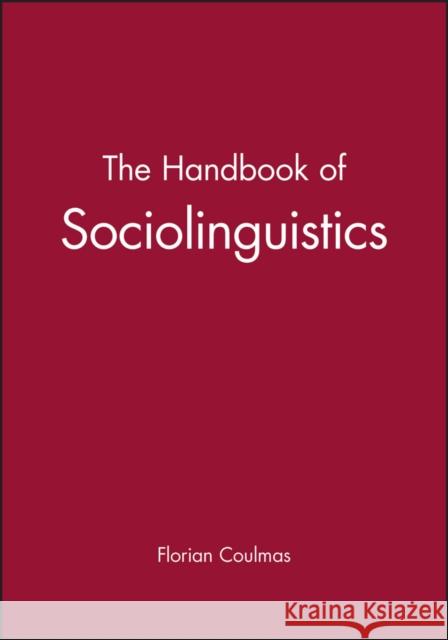The Handbook of Sociolinguistics » książka



The Handbook of Sociolinguistics
ISBN-13: 9780631211938 / Angielski / Miękka / 1998 / 544 str.
The Handbook of Sociolinguistics
ISBN-13: 9780631211938 / Angielski / Miękka / 1998 / 544 str.
(netto: 274,71 VAT: 5%)
Najniższa cena z 30 dni: 284,93
ok. 30 dni roboczych.
Darmowa dostawa!
In 28 newly- commissioned chapters, distinguished contributors provide an up-to-date overview of sociolinguistics.
".....the decision to commission 28 articles by leading specialists and to have them combined in this anthology makes excellent sense."The book is excellently edited and printed. It provides up–to–date information on most subdisciplines of sociolinguistics." Manfred Gorlach, Universitat zu Koln
"It.....presents fresh insights into many subjects, and the papers that are true review articles provide comprehensive bibliogrphic materials for further research.".....this collection offers much of interest and a breadth that makes it a useful resource."Sharon Ash, University of Pennsylvania
Introduction: Florian Coulmas (Chou University).
Part I: Foundations:.
1. The Evolution of a Sociolinguistic Theory of Language: R.B. Le Page.
2. The Demography of Language: Albert F. Verdoot (Université Catholique de Louvain).
Part II: Social Dimensions of Language: .
3. Varieties and Variation: James Milroy and Lesley Milroy (University of Newcastle upon Tyne).
4. Language Change in Progress: Variation as it Happens: Norman Denison (Universität Graz).
5. Social Factors in Language Change: William Bright.
6. Sociophonology: John Honey (Osaka International University).
7. Dialect in Society: Walt Wolfram (North Carolina State University).
8. Gender as a Sociolinguistics Variable: New Perspectives on Variation Studies: Ruth Wodak and Gertraud Benke (Universität Wien).
9. Age as a Sociolinguistic Variable: Penelope Eckert (Institute for Research on Learning).
10. Spoken and Written Language: Celia Roberts and Brian Street (Thames Valley University; University of Brighton).
11. The Sociolinguistics of Communication Media: Gerhard Leitner (Freie Universit&aunl;t Berlin).
12. Diglossia as a Sociolinguistic Situation: Harold F. Schiffman (Language Center, SARS).
13. Code Switching: Carol Myers Scotton (University of South Carolina).
14. Language Contact and Language Generation: John R. Rickford (Stanford University).
15. Language Contact and Language Degeneration: Colette Grinevald Craig (University of Oregon).
Part III: Linguistic Dimensions of Society:.
16. Language Contact and Language Displacement: Mathias Brenzinger (Universität zu Koln).
17. Language Conflict: Peter Hans Nelde (Research Centre on Multilingualism, KUB).
18. Multi–Lingualism: Michael Clyne (Monash University).
19. Language and Identity: Andree Tabournet–Keller (Université Louis–Pasteur).
20. Language and Ethnicity: Joshua A. Fishma.
21. Global Scale Sociolinguistics: Grant McConnell (Université Laval).
22. Language and the Mediation of Experience: Linguistics Representation and Cognitive Orientation: Michael Stubbs (Universit&aunl;t Trier).
23. Linguistics Etiquette: Gabriele Kasper (University of Hawaii at Manoa).
Part IV: Applied Issues:.
24. Sociolinguistics and Education: Ludo Verhoeven (Tilburg University).
25. Bilingual Education: Ofelia Garcia (City College of New York).
26. Sociolinguistics and the Law: Edward Finegan (University of Southern California).
27. Language Planning and Language Reform: Denise Daoust (Université de Quebec à Montreal).
Bibliography.
Index.
Florian Coulmas is Professor of Sociolinguistics at Chuo University, Tokyo. He was previously Professor of General Linguistics at Dusseldorf University and Research Fellow of the National Language Institute, Tokyo. He has been visiting Professor at Georgetown University and Fellow of the Institute of Advanced Study, Berlin. His principle fields of interest are the study of writing and sociolinguistics.
In 28 newly–commissioned chapters, distinguished contributors provide an up–to–date overview of sociolinguistics. This invaluable work of reference, now available in paperback, identifies the most important issues of sociolinguistics, makes primary sources more accessible, and provides orientation for future research.
Reflecting the main division within the discipline, the two key sections deal with the social dimensions of language and the linguistic dimensions of society. In addition, there is an introductory section taking issue with the theoretical and methodological foundations of sociolinguistic knowledge which have proved to be especially fruitful in recent years: education, bilingual education, the legal profession and language planning. The Handbook is equipped with a comprehensive bibliography which can be used as a research tool in its own right.
1997-2026 DolnySlask.com Agencja Internetowa
KrainaKsiazek.PL - Księgarnia Internetowa









